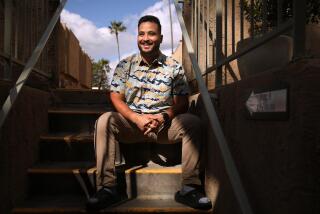TV REVIEW : ‘BIG GAMBLE’ REPORT OUT OF FOCUS
- Share via
When Bill Moyers pulls the handle on the TV slot machine, history suggests he’s likely to hit the jackpot with a program that is penetrating, perceptive and provocative. No one wins every time out, though, and in tonight’s report for CBS, “Big Gamble in Atlantic City” (10 p.m., Channels 2 and 8), he comes up with lemons.
The subject is the gamble that Atlantic City took on gambling 10 years ago. Like most bettors, the New Jersey municipality lost. Hoping that casinos would revive the city’s dying fortunes, residents have seen them instead accelerate the demise to the point where the once-glamorous seaside tourist mecca apparently is more blighted and barren than any desert vista associated with that other gambling haven, Las Vegas.
The irony is that gambling is a huge success in Atlantic City. “There are 30 million visitors here every year, 40,000 new jobs and $3 billion in new investment,” Moyers says. It just doesn’t seem to have trickled down to the people of Atlantic City.
That, at least, is the premise of the program. Yet a poll conducted by CBS News last April found that while Atlantic City residents believed that crime had increased and housing had declined since gambling arrived, 46% of them felt that, overall, the city was better off now, compared to 28% who thought it was worse. Moreover, 50% thought it would be better 10 years from now and 53% of them said they would still vote to bring in gambling.
The documentary, produced and directed by Jude Dratt with Jon Katz as executive producer, reports some of these findings but doesn’t attempt to square them with the story it’s trying to tell of what one resident calls “the greatest urban tragedy that has ever happened to this country.”
Instead Moyers takes confessions from local residents and merchants about how naive they were about the way casinos operate. He doesn’t ask where all the new money has gone. No government officials appear on the broadcast, but there are lengthy interviews with a couple of gamblers about why they gamble.
Clearly, for other cities or states considering turning to gambling casinos as a way out of economic difficulties, there are lessons to be learned from Atlantic City’s experiences. With its soft, unprobing approach, however, “Big Gamble” only gets around to a few of them.
More to Read
The complete guide to home viewing
Get Screen Gab for everything about the TV shows and streaming movies everyone’s talking about.
You may occasionally receive promotional content from the Los Angeles Times.






